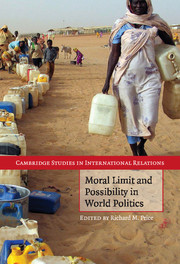Book contents
- Frontmatter
- Contents
- List of contributors
- Preface
- 1 Moral limit and possibility in world politics
- 2 Constructivism and the structure of ethical reasoning
- 3 The role of consequences, comparison and counterfactuals in constructivist ethical thought
- 4 Sovereignty, recognition and indigenous peoples
- 5 Policy hypocrisy or political compromise? Assessing the morality of US policy toward undocumented migrants
- 6 Lie to me: sanctions on Iraq, moral argument and the international politics of hypocrisy
- 7 Paradoxes in humanitarian intervention
- 8 Inevitable inequalities? Approaching gender equality and multiculturalism
- 9 Interstate community-building and the identity/difference predicament
- 10 Progress with a price
- Index
- Cambridge Studies in International Relations
- References
1 - Moral limit and possibility in world politics
Published online by Cambridge University Press: 14 May 2010
- Frontmatter
- Contents
- List of contributors
- Preface
- 1 Moral limit and possibility in world politics
- 2 Constructivism and the structure of ethical reasoning
- 3 The role of consequences, comparison and counterfactuals in constructivist ethical thought
- 4 Sovereignty, recognition and indigenous peoples
- 5 Policy hypocrisy or political compromise? Assessing the morality of US policy toward undocumented migrants
- 6 Lie to me: sanctions on Iraq, moral argument and the international politics of hypocrisy
- 7 Paradoxes in humanitarian intervention
- 8 Inevitable inequalities? Approaching gender equality and multiculturalism
- 9 Interstate community-building and the identity/difference predicament
- 10 Progress with a price
- Index
- Cambridge Studies in International Relations
- References
Summary
Introduction
At what point, if any, is one to reasonably concede that the ‘realities’ of world politics require compromise from cherished principles or moral ends, and that what has been achieved is ethically justified? How do we really know we have reached an ethical limit when we see one, or fallen short in ways that deserve the withholding of moral praise? Less abstractly, how might we seek to reconcile the cherished freedoms of liberal democracy with restrictions on immigration? Can war legitimately be waged in defence of human rights, and override competing moral claims to self-determination? Can the perpetuation of slaughter be risked by refusing amnesties to perpetrators of atrocities in order to enforce international criminal law? Is there any way to ethically navigate moral dilemmas such as the above, ones that seem to require choices between cosmopolitanism and communitarianism, or consequentialism and deontology, or the oft-competing demands between procedural and substantive justice?
As the history of ethics and international political theory attest, these are difficult enough questions for which to hope for some answer, not the least given traditions of thought like realism that deny the very existence of developments we could call ethically progressive change in world politics in the first place. But it becomes even more difficult still if a research programme that has itself led the charge in empirically documenting putative moral progress inherently problematises the very grounds upon which prima facie judgements of moral good are often made.
- Type
- Chapter
- Information
- Moral Limit and Possibility in World Politics , pp. 1 - 52Publisher: Cambridge University PressPrint publication year: 2008
References
- 4
- Cited by



